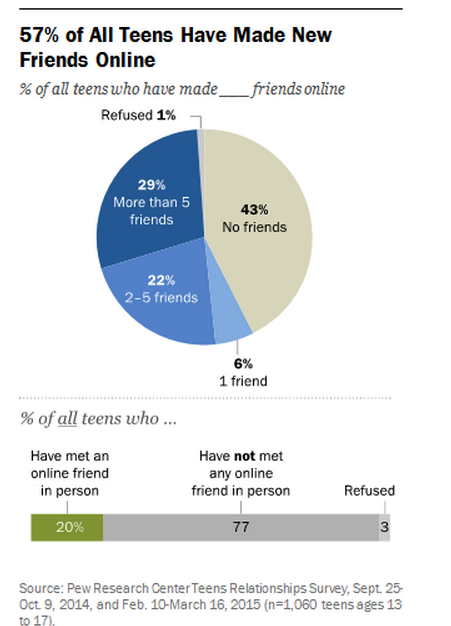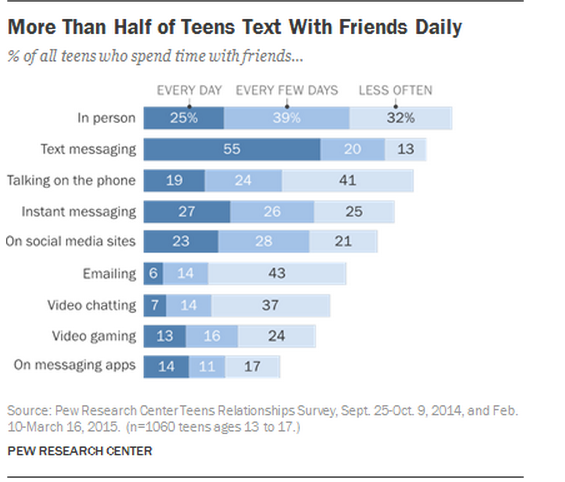
It comes as no surprise that teens are heavy users of social media and mobile phones. But, based on a new survey from Pew Research, we now know that a majority (57 percent) of teens have met at least one new friend online while 29 percent say they have met at least five friends that way. The survey also found that most of these friendships remain online. Only 20 percent of teens have met an online friend in person.
More than three quarters (76 percent) of teens use social media and 71 percent of all teens say they spend time interacting with friends on social media while 23 percent say they do so every day.
 The study, Teens, Technology and Friendships involved interviews with just over 1,000 teens between 13 and 17 between September 2014 and February 2015.
The study, Teens, Technology and Friendships involved interviews with just over 1,000 teens between 13 and 17 between September 2014 and February 2015.
I was surprised to learn that boys are more likely to meet friends online than girls (61 percent vs. 52 percent) until I realized that video games were part of the equation. Boys are more likely to play video games (84 percent compared to 59 percent of girls) and a lot more likely (57 percent vs. 13 percent) to meet a new friend while playing a game. That’s because many of today’s online games involve interacting, competing or cooperating with other players and the Pew data reflects what I have learned from speaking with teens. Not only is gaming a way for teens to meet and socialize, but it can also be a learning venue for a variety of useful skills including, of course, collaboration and planning.
Social media sites including Facebook and Instagram remain the most popular meeting grounds for teens. Nearly two-thirds (64 percent) say they’ve made a friend online via social media. Girls are a lot more likely (78 percent vs. 52 percent) to meet friends through social media.
But don’t let these statistics fool you into thinking that teens have no in-person social lives. The survey found that 95 percent of teens spend time with friends in- person, at least occasionally, while away from school. A quarter said they do so on a daily basis. More than half (55 percent) say they text their friends on a daily basis while 79 percent keep in touch with friends via instant messaging and 72 percent through social media though not necessarily on a daily basis.
Overall, 59 percent of teens “are in touch with their closest friend on a daily basis, with 41 percent indicating that they get in touch ‘many times a day’,” according to the survey’s authors. And, 83 percent of teen social media users say social media makes them feel more connected to information about their friends’ lives, with 70 percent saying they feel more connected with their friends’ feeling.
 For the most part, the study is good news for parents who worry about their teen’s use of mobile and social media. Teens are mostly using these tools to maintain friendships while some are also using them to meet new people.
For the most part, the study is good news for parents who worry about their teen’s use of mobile and social media. Teens are mostly using these tools to maintain friendships while some are also using them to meet new people.
And, as a parent of young adults, I can testify that my kids have consistently used social media, texting and email to remain in touch with friends from middle school and high school. This is admittedly anecdotal, but my kids are in much more frequent contact with their far-flung network of childhood friends than I was at their age.
While the survey didn’t cover this, I’m sure that some parents worry about friends kids meet online but, in 80 percent of cases, teens never see those people in-person and, when they do, data from other studies suggest that the vast majority of those who do have in-person meetings do not experience anything negative.
The final report of the 2008 Internet Safety Technology Task Force cited research showing that “Internet-initiated connections that result in offline contact are typically friendship-related, nonsexual, and formed between similar-aged youth and known to parents.” That report challenged the notion about adult predators claiming to be fellow teens to ensnare youth. A study of adult offenders found that only about 5 percent “pretended to be the same age as the youth victim online.”
The survey wasn’t all good news. Most (88 percent) teenage social media users believe that people share too much information about themselves on social media with 42 percent saying they have had someone post things on social media about them that they cannot change or control. And, for some, social media can bring on sadness with 21 percent reporting, “feeling worse about their own life because of what they see from other friends on social media.” You can find a lot more information about teens and social media at ConnectSafel.org, the site of a non-profit organization where I serve as CEO.
This post first appeared in the San Jose Mercury News